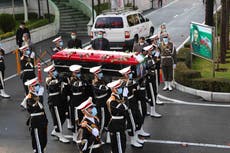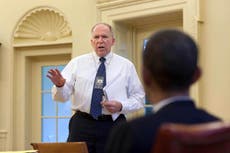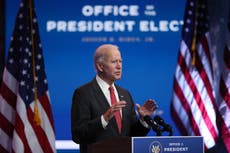The killing of Mohsen Fakhrizadeh will not end the chance of a Iran-US detente – but time is of the essence
Joe Biden’s administration will not bring an immediate re-entry of Washington into the nuclear deal with Tehran, there will be a lot of talking to be done

Your support helps us to tell the story
From reproductive rights to climate change to Big Tech, The Independent is on the ground when the story is developing. Whether it's investigating the financials of Elon Musk's pro-Trump PAC or producing our latest documentary, 'The A Word', which shines a light on the American women fighting for reproductive rights, we know how important it is to parse out the facts from the messaging.
At such a critical moment in US history, we need reporters on the ground. Your donation allows us to keep sending journalists to speak to both sides of the story.
The Independent is trusted by Americans across the entire political spectrum. And unlike many other quality news outlets, we choose not to lock Americans out of our reporting and analysis with paywalls. We believe quality journalism should be available to everyone, paid for by those who can afford it.
Your support makes all the difference.In the hours after the news broke of Qassem Soleimani’s death at the beginning of the year, General Hossein Kanani Moghadam recalled getting many offers to seek revenge for the assassination of the Iranian Revolutionary Guard Corps (IRGC) commander by the US.
“I was contacted by groups in many countries – in Iran, Syria, Yemen, Afghanistan, north Africa, other parts of Asia – all saying they wanted to avenge the death of the martyr Soleimani to honour him”, Soleimani’s predecessor in the Guards told me at his home in Tehran, earlier this year, a month after the killing.
“But I advised them not to do anything, to wait to see what happens, what the political consequences will be," he added. "Also, on a military level, the US forces were at a high level of alert; you do not fight the enemy when he is fully prepared and expecting an attack. You do not want to play the enemy’s game by his rule: you wait.”
The killing of Soleimani – alongside that of Abu Mahdi al-Muhandis, the leader of Kata’ib Hezbollah who are part of the Iraqi militia Popular Mobilisation Forces (PMF), a long-time ally of Iran – was followed by repeated vows of retribution from the Iranian leadership.
The only known major act of retaliation was a missile attack on the Ayn al-Asad airbase at Anbar in Iraq. Iran, it is believed, warned the Iraqi government before the assault took place, and they in turn passed on the information to Washington. No US service personnel were killed, although a number are said to have suffered varying degrees of brain injuries.
Moghadam was not the only senior Iranian with ties to the country’s military and political hierarchy who urged caution at the time. A number of others I spoke to also stressed the urgent need, as they saw it, not to fall into a trap of an escalating conflict wanted by Donald Trump.
There were huge marches on the streets demanding that Iran strike back. But these were followed by widespread street protests when the IRGC shot down a Ukrainian airliner mistaking it, said the authorities, for an incoming missile. The call for vengeance faded, with the ordinary people I spoke to in Tehran not wanting a war to go with all the other tribulations they were facing.
Time was a crucial factor for those counselling against large-scale military action. Soleimani’s killing was in January, the US presidential elections were coming in November. The logical thing, a number of senior officials pointed out, was to wait and hope that Trump lost. Then the immediate threat he poses, on behalf of the Israelis and the Saudis, would dissipate.
I spoke to some of the same officials after the killing of the nuclear scientist Mohsen Fakhrizadeh, the Iranian nuclear scientist by, it is claimed by Iran, the Israelis.They were busy pressing for patience for just a little while longer, until Trump leaves and Joe Biden takes over.
The Supreme Leader, Ayatollah Ali Khamenei, declared that those behind the killing should receive "definitive punishment" while the president, Hassan Rouhani said: “The Iranian nation and the officials in charge in the country are brave and determined to respond to the murder in time,” But he also added “the Iranian nation is smarter than falling into the trap of the Zionists. They are thinking to create chaos.”
The killing of Fakhrizadeh took place soon after Mike Pompeo’s visit to the Middle East, which included stops in Israel and Saudi Arabia. One of the main topics of the talks was combating Iran.
There is no evidence that the outgoing US secretary of state was privy to any assassination plot. But we do know that Trump wanted to carry out an attack on Iran and he was dissuaded from doing so by Pompeo, Mike Pence and the chairman of the joint chiefs, General Mark Milley. Even Christopher Miller, brought in as a hawkish replacement for the sacked defence secretary, Mark Esper, argued against it. Trump is understood to have been still seeking to punish Iran for “hiding” its nuclear programme, and had asked for other options: the assassination of Fakhrizadeh would certainly be such an option.
There is little reason to believe that the killing was solely to do with halting Iran’s nuclear programme. Its aim may have been to provoke a violent retaliation, followed by an armed response, with the hope that would make it difficult for the Biden administration to start talks with Iran on getting America back into the nuclear agreement, the Joint Comprehensive Plan of Action (JCPOA).
As Mark Fitzpatrick, the former US diplomat now with the International Institute for Strategic Studies (IISS) wrote: “US President Donald Trump vowed four years ago to kill the 2015 Iran nuclear deal … Now, in his last weeks in office, the coup de grace may have been delivered by means of an Israeli assassination of Iranian nuclear scientist Mohsen Fakhrizadeh on 27 November. The prospect of restoring the Joint Comprehensive Plan of Action (JCPOA) in the upcoming Joe Biden administration has become even more fraught."
But has the killing really delivered a coup de grace to the JCPOA? Or, for that matter, dealt a huge blow to Iran’s nuclear programme?
Let’s take the nuclear programme first. Trump retweeted the Israeli journalist Yossi Melman, who has extensive Mossad contacts, saying that that Fakhrizadeh’s death is “a major psychological and professional blow for Iran.” But what Melman goes on to say in the quoted Haaretz article is that “despite the blow to morale, Iran will find a nuclear scientist just as talented as the assassinated Fakhrizadeh.”
This is not the first time those involved with Iran’s nuclear programme have met violent deaths. In just two years, between 2010 and 2012, four scientists – Masoud Alimohammadi, Majid Shaihirani, Darioush Rezaeinejad and Mostafa Roshan – were killed while another, Fereydoon Abbasi, survived an attempted murder. All the attacks were ascribed to the Israelis. Israel maintains a policy of not commenting on such allegations
But these killings did not end Iran’s nuclear programme. According to the Israeli prime minister, Benjamin Netanyahu, the need to take action against Iran is imperative because the Iranians are on the way to acquiring a nuclear arsenal despite all the assassinations.
The JCPOA was set up, painstakingly, after prolonged negotiations, precisely to stop Iran getting the bomb. The assassination of Fakhrizadeh may give the hardliners in Iran, who had been against the nuclear agreement, more ammunition against staying it. But Trump’s actions have already strengthened them.
I covered the majlis, parliamentary, elections in Iran four years ago when the reformers won a sweeping victory, and then a year later, when President Hassan Rouhani, who had signed the JCPOA, was re-elected. That massive support was based on the hopes and expectations, economic and social, the opening out to the outside world that the nuclear agreement would bring.
All that was crushed when Trump imposed swingeing sanctions after pulling the US out of the JCPOA. The hardliners won a crushing victory in the last majlis elections in February this year, winning every seat in Tehran – and won a significant majority across the country. A large number of people I spoke to, who had backed the reformers in the past, did not bother to vote this time.
The turnout was the lowest since the 1979 revolution, hovering at just 42 per cent, compared to 62 per cent in the previous election. The figure fell to 25 per cent in the cities, where the electorate had previously helped to put the reformists in power.
The coming of the Biden administration will not mean an immediate re-entry of the US into the JCPOA, there will be a lot of talking to be done, on matters such as Iranian stockpiling of uranium, but the likelihood is that the agreement will get back on track.
A group of leading European diplomats – including former UK Middle East minister Alistair Burt; the former Swedish prime minister Carl Bildt; Wolfgang Ischinger, the former German ambassador to the US; Jean-David Levitte, the former French ambassador to the US; the former Nato secretary general Javier Solana; and the former Polish foreign minister Andrzej Olechowski – has called for a roadmap for both Iran and the new US administration. This would be an important and very useful step.
The group, in a statement coordinated by the European Council on Foreign Relations, suggests that Britain, France and Germany – signatories to the JCPOA – work on a joint commission to be set up before Biden is inaugurated, and help draw up a path for compliance by Washington and Tehran once he is in the White House.
The killing of Mohsen Fakhrizadeh will not destroy the chances of reconciliation between the US and Iran. But it does show how lethal actions are being taken by those who do not want the two countries to return to the negotiating table. There is also a danger that some of Iran’s allied groups, who wanted to get retribution for Soleimani, may not be controllable this time.
What has happened illustrates that with seven weeks left until Trump goes and Biden takes over, time is now of utmost essence.





Join our commenting forum
Join thought-provoking conversations, follow other Independent readers and see their replies
Comments